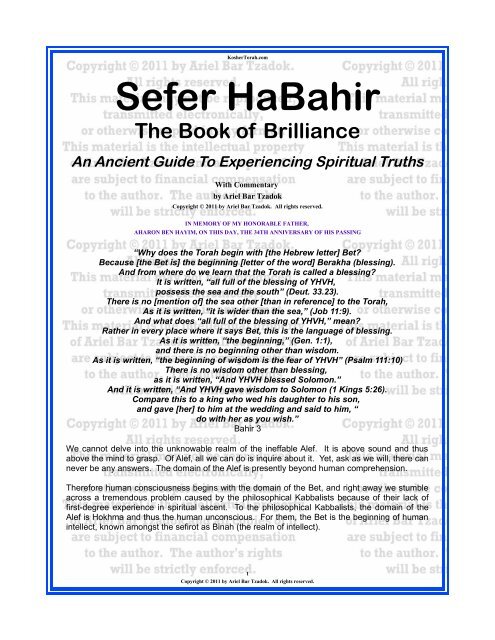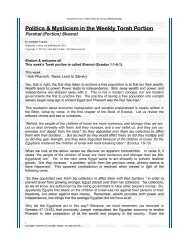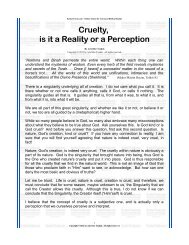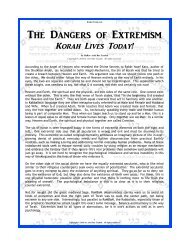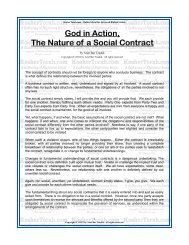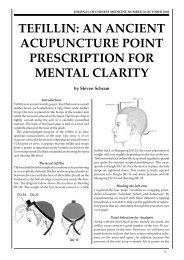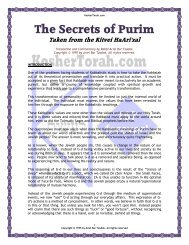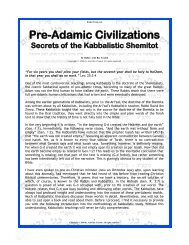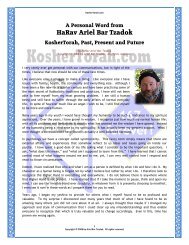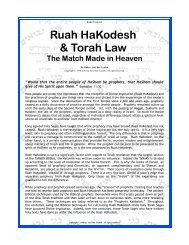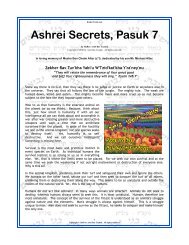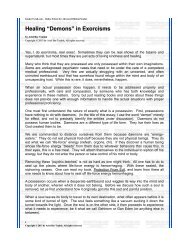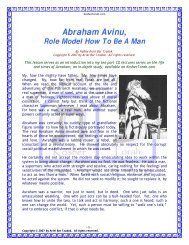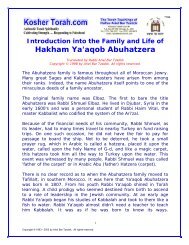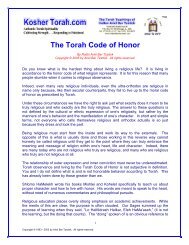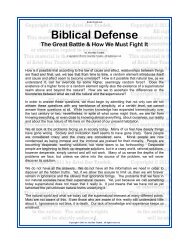The Sefer Bahir - Book of Brilliance, #3 - KosherTorah.com
The Sefer Bahir - Book of Brilliance, #3 - KosherTorah.com
The Sefer Bahir - Book of Brilliance, #3 - KosherTorah.com
You also want an ePaper? Increase the reach of your titles
YUMPU automatically turns print PDFs into web optimized ePapers that Google loves.
<strong>KosherTorah</strong>.<strong>com</strong><br />
<strong>Sefer</strong> Ha<strong>Bahir</strong><br />
<strong>The</strong> <strong>Book</strong> <strong>of</strong> <strong>Brilliance</strong><br />
An Ancient Guide To Experiencing Spiritual Truths<br />
With Commentary<br />
by Ariel Bar Tzadok<br />
Copyright © 2011 by Ariel Bar Tzadok. All rights reserved.<br />
IN MEMORY OF MY HONORABLE FATHER,<br />
AHARON BEN HAYIM, ON THIS DAY, THE 34TH ANNIVERSARY OF HIS PASSING<br />
“Why does the Torah begin with [the Hebrew letter] Bet?<br />
Because [the Bet is] the beginning [letter <strong>of</strong> the word] Berakha (blessing).<br />
And from where do we learn that the Torah is called a blessing?<br />
It is written, “all full <strong>of</strong> the blessing <strong>of</strong> YHVH,<br />
possess the sea and the south” (Deut. 33.23).<br />
<strong>The</strong>re is no [mention <strong>of</strong>] the sea other [than in reference] to the Torah,<br />
As it is written, “it is wider than the sea,” (Job 11:9).<br />
And what does “all full <strong>of</strong> the blessing <strong>of</strong> YHVH,” mean?<br />
Rather in every place where it says Bet, this is the language <strong>of</strong> blessing.<br />
As it is written, “the beginning,” (Gen. 1:1),<br />
and there is no beginning other than wisdom.<br />
As it is written, “the beginning <strong>of</strong> wisdom is the fear <strong>of</strong> YHVH” (Psalm 111:10)<br />
<strong>The</strong>re is no wisdom other than blessing,<br />
as it is written, “And YHVH blessed Solomon.”<br />
And it is written, “And YHVH gave wisdom to Solomon (1 Kings 5:26).<br />
Compare this to a king who wed his daughter to his son,<br />
and gave [her] to him at the wedding and said to him, “<br />
do with her as you wish.”<br />
<strong>Bahir</strong> 3<br />
We cannot delve into the unknowable realm <strong>of</strong> the ineffable Alef. It is above sound and thus<br />
above the mind to grasp. Of Alef, all we can do is inquire about it. Yet, ask as we will, there can<br />
never be any answers. <strong>The</strong> domain <strong>of</strong> the Alef is presently beyond human <strong>com</strong>prehension.<br />
<strong>The</strong>refore human consciousness begins with the domain <strong>of</strong> the Bet, and right away we stumble<br />
across a tremendous problem caused by the philosophical Kabbalists because <strong>of</strong> their lack <strong>of</strong><br />
first-degree experience in spiritual ascent. To the philosophical Kabbalists, the domain <strong>of</strong> the<br />
Alef is Hokhma and thus the human unconscious. For them, the Bet is the beginning <strong>of</strong> human<br />
intellect, known amongst the sefirot as Binah (the realm <strong>of</strong> intellect).<br />
1<br />
Copyright © 2011 by Ariel Bar Tzadok. All rights reserved.
<strong>KosherTorah</strong>.<strong>com</strong><br />
For the philosophical Kabbalists, the intellect is their highest domain <strong>of</strong> achievement. <strong>The</strong>y<br />
never delve into the unconscious and because <strong>of</strong> this they have misidentified and confused the<br />
true identity <strong>of</strong> the Alef and the Bet.<br />
Alef is the domain <strong>of</strong> the sefirah Keter, the seat <strong>of</strong> Will, the source <strong>of</strong> Self. Hokhma is the<br />
second realm, the true domain <strong>of</strong> the letter Bet, the realm <strong>of</strong> the unconscious, the place where<br />
the supernal Will, called wisdom, manifests an aspect <strong>of</strong> itself. <strong>The</strong> Bet corresponds to the<br />
unconscious mind <strong>of</strong> the sefirat Hokhma, not the conscious mind <strong>of</strong> the sefirat Binah, which<br />
should rightly be called Gimel (the third letter in the Hebrew alphabet).<br />
<strong>The</strong> Torah begins with Bet, and includes the creation <strong>of</strong> both the Heavens and the Earth. <strong>The</strong><br />
Earth corresponds to the conscious mind associated with the physical world. Heaven<br />
corresponds to the unconscious mind associated with the spiritual world. Both are creations <strong>of</strong><br />
YHVH and we human beings have access to both within ourselves.<br />
<strong>The</strong> Bet, also having the value <strong>of</strong> two, indicates that it represents the second layer <strong>of</strong> the<br />
unconscious concealing within it the deeper source Will (Keter). As the value <strong>of</strong> two, it also<br />
corresponds to the dual creation <strong>of</strong> Heaven and Earth, the spiritual and the physical and the<br />
unconscious and conscious aspects <strong>of</strong> the mind. Unless one knows and embraces both, then<br />
one does not know that which ELOHIM has made and thus can never penetrate to know YHVH,<br />
the Name and level <strong>of</strong> the Divine associated with the descent into the unconscious, into firstdegree<br />
spiritual ascent and experience.<br />
Only one with actual experience in spiritual ascent, that which is traditionally called Ma'aseh<br />
Merkava, can be said to have received a blessing from YHVH. Yet, in order to understand this,<br />
we must understand what exactly is a Berakha (blessing). It certainly is not just good wishes<br />
that one bestows upon another. A Berakha is an actual bestowal <strong>of</strong> life-force creative energy,<br />
the Nefesh, Chi or Orgone. It is an actual thing, not merely good wishes. Wishing someone well<br />
is just fine, but mere words alone, however much passionately spoken and intended, does not<br />
meet the criteria <strong>of</strong> the Biblical definition <strong>of</strong> the term Berakha (blessing).<br />
When one is actually blessed, one has received an influx <strong>of</strong> spiritual energy imbued within one's<br />
unconscious. <strong>The</strong>n, through the process <strong>of</strong> spiritual ascent, one taps into the reservoir inside<br />
oneself and unleashes that which has been placed there. If the spiritual influx has not been<br />
placed there, then the individual does not have much from which to draw upon. As such, the<br />
individual does not have strong inner resources to ac<strong>com</strong>plish whatever tasks or desires that he<br />
may so desire. This is why so many people today fail in their life’s endeavors. Simply stated,<br />
they are not blessed, nor do they understand what it really means to receive the power <strong>of</strong> the<br />
blessing.<br />
<strong>The</strong> power <strong>of</strong> the blessing was well known in Biblical times. Genesis 27 records the famous<br />
story <strong>of</strong> Issac's call to bless his son Esau and how Jacob intercepted that blessing. Because a<br />
blessing is such a potent force, Mother Rivka craved it for her son Jacob and wanted to prevent<br />
her other son Esau from acquiring it. Isaac's words to his son(s) were not mere words <strong>of</strong> good<br />
wishes. No, Isaac was actually imbuing his son with a powerful spiritual <strong>com</strong>ponent that would<br />
enable him to ac<strong>com</strong>plish great deeds. When Esau realized he had lost this, he knew he would<br />
forever be at a disadvantage before his brother Jacob. This is why he sought to kill him and why<br />
the descendants <strong>of</strong> Esau hate the descendants <strong>of</strong> Jacob to this day. Yet, inevitably the blessing<br />
<strong>of</strong> father Isaac will eventually prevail and Esau will ultimately succumb to his brother Jacob. This<br />
2<br />
Copyright © 2011 by Ariel Bar Tzadok. All rights reserved.
<strong>KosherTorah</strong>.<strong>com</strong><br />
is the power <strong>of</strong> the blessing. It takes on a life <strong>of</strong> its own. One way or another the power <strong>of</strong> the<br />
blessing seeks to ac<strong>com</strong>plish that for which it came, at the behest <strong>of</strong> G-d, the Creator.<br />
So, creation began with the Bet <strong>of</strong> Berakha (blessing) to teach us that this Divine power and<br />
purpose, this Nefesh, Chi or Orgone, permeates everything in creation and that ultimately<br />
creation will fulfill the purpose for which it was created. It is inevitable.<br />
Torah also begins with Bet, for Torah is G-d's chosen agent and form that permeates human<br />
consciousness and enables the individual to have access to the penetrating power that unlocks<br />
the unconscious and unleashes the inherent Bet (<strong>of</strong> Berakha) latent within each <strong>of</strong> us. Thus<br />
Torah is called Berakha (blessing) because it is the source <strong>of</strong> life and the guide into the inner<br />
recesses <strong>of</strong> the unconscious mind.<br />
Chanting words <strong>of</strong> Torah in accordance to specific formulas unlocks closed channels in the<br />
unconscious and enables one to spiritually travel, to ascend before the Throne <strong>of</strong> G-d. This is<br />
why this work is called the Ma'aseh Merkava, the work <strong>of</strong> the chariot. This is the mental work<br />
performed that unleashes the mind enabling it to penetrate the Earth, to rise to Heaven and thus<br />
stand before the metaphorical Throne. Sitting upon the Throne is one with the image <strong>of</strong> G-d (as<br />
seen in Ezekiel's vision), experienced as the Bet, yet, concealing within it the ineffable Alef,<br />
G-d's true unknown and unknowable “Face.”<br />
<strong>The</strong> Torah itself is considered a metaphor for the unconscious mind. Just like the human mind<br />
has its superficial surface layer covering over depths and layers within, so too does the Torah<br />
have its surface level called Pshat and its inner depths called Sod. Yet, Pshat and Sod are not<br />
as the philosophical Kabbalists would have one believe to be subjects <strong>of</strong> study, but rather Pshat<br />
and Sod are methods <strong>of</strong> study. Pshat and Sod differ as do the conscious mind and the<br />
unconscious. Indeed, in Kabbalistic literature the difference between the two are <strong>of</strong>ten<br />
symbolized as the difference between sight and sound, with sight being Sod and sound being<br />
Pshat.<br />
Sound <strong>com</strong>munication requires words and sentences, which is in itself a very limited and rigid<br />
form <strong>of</strong> <strong>com</strong>munication. If one does not know the language one understands little. Sight<br />
however is <strong>com</strong>pletely different. A picture is worth a thousand words and speaks to all equally<br />
without need <strong>of</strong> speech. For example, I can ask a hungry man if he wants an apple, yet if he<br />
does not understand my language, my question is not understood and goes unanswered, the<br />
result being he may die <strong>of</strong> hunger. Yet, if I take out an apple and show it to him, then without<br />
words, he expresses by deed his desire for the apple, takes it, eats and thus saves his life.<br />
Pshat is academic and philosophical. It is platonic. It is full <strong>of</strong> words and talk and lacks every bit<br />
<strong>of</strong> experience. Sod, on the other hand, arises from within in that place where the human soul<br />
meets the soul <strong>of</strong> the Torah itself, this is the domain <strong>of</strong> the concealed Alef. From here it arises<br />
out <strong>of</strong> the unconscious depths, with aspects, recollections and insights bubbling into<br />
consciousness, giving rise to revelations. <strong>The</strong>se arise from within the depths <strong>of</strong> the unconscious<br />
in similar manner to how something could rise from the depths <strong>of</strong> the sea. One does not see<br />
where it <strong>com</strong>es from, other than to see that it <strong>com</strong>es from deep within. <strong>The</strong>refore is the Torah<br />
<strong>com</strong>pared to the depths <strong>of</strong> the sea. As the source from which <strong>com</strong>e forth the unconscious<br />
content, Torah is called the source <strong>of</strong> blessing. For there is no greater blessing, influx <strong>of</strong> lifeforce<br />
energy, more than clarified thought and directed will, that when joined together make<br />
almost every endeavor possible to achieve.<br />
3<br />
Copyright © 2011 by Ariel Bar Tzadok. All rights reserved.
<strong>KosherTorah</strong>.<strong>com</strong><br />
<strong>The</strong> verse says that the fear <strong>of</strong> G-d is the beginning <strong>of</strong> wisdom. Here we see the relationship<br />
between the acquisition <strong>of</strong> unconscious content, always referred to as Hokhma (wisdom) and<br />
what is here called the fear <strong>of</strong> G-d. This term, in Hebrew, Yirat YHVH, does not actually mean<br />
“fear,” but rather “awe.” Awe is an experience <strong>of</strong> being overwhelmed beyond that which can be<br />
described by words. Awe means recognizing one's smallness in <strong>com</strong>parison to the others<br />
overwhelming largeness. Again, this is not an academic acknowledgment <strong>of</strong> the facts, but rather<br />
a deeper, almost emotional experience <strong>of</strong> them.<br />
When one reaches this level <strong>of</strong> experience <strong>of</strong> recognizing and experiencing the awesomeness <strong>of</strong><br />
the Presence <strong>of</strong> the Divine, this is said to be the first step into a greater world. This is the<br />
beginning <strong>of</strong> wisdom. It is from this initial state <strong>of</strong> experience that one can then be guided by<br />
internal content bubbling up from deep within one's unconscious and from deep within the Torah.<br />
In harmony, like male and female, one's internal intuition guides one to see things in Torah not<br />
perceivable to the philosophical mind.<br />
This is how King Solomon was able to achieve a level and depth <strong>of</strong> wisdom unattained by all<br />
others both before him and after him. He could gaze upon the words <strong>of</strong> Torah and through them<br />
unlock the secrets <strong>of</strong> creation. This was the power <strong>of</strong> Adam prior to the fall in Eden. Only the<br />
experiential Kabbalist who descends before the Merkava has any knowledge and experience <strong>of</strong><br />
this. To all others, the Torah is a closed book <strong>of</strong> <strong>of</strong> mere words and sentences, interpreted over<br />
and and over again, but never getting to the depths <strong>of</strong> what those words really mean. Rightly<br />
did Rabbi Eliyahu, the Gaon <strong>of</strong> Vilna say in his book, Even Shelayma. that those who do not<br />
know Sod will never properly understand Pshat,<br />
<strong>The</strong> relationship <strong>of</strong> the inner mind and the inner Torah can be <strong>com</strong>pared to husband and wife, or<br />
as the <strong>Bahir</strong> states, as the son and daughter <strong>of</strong> the King wedded. This symbol refers to the son<br />
<strong>of</strong> the King, the unconscious content <strong>of</strong> the mind, the sefirat Hokhma within, wedded to the<br />
deeper levels within the Torah, which is both the inner levels <strong>of</strong> Binah, intellect and Malkhut,<br />
form. Do with her as you wish, the <strong>Bahir</strong> states. In other words, the unconscious mind, tapped<br />
into direct first-degree experience <strong>of</strong> G-d can gaze upon the Torah and see within it that which<br />
others cannot. This interaction <strong>of</strong> intuitive mind and intuitive Torah can rightfully be <strong>com</strong>pared to<br />
the act <strong>of</strong> erotic love-play.<br />
Only when one sets out on the proper path can one ever expect to arrive at the proper<br />
destination. Philosophical Kabbalah is an excellent philosophy and <strong>of</strong>fers keen psychological<br />
insights into human nature. Yet, many <strong>of</strong> its later forms have be<strong>com</strong>e bogged down in<br />
meaningless details that take the mind <strong>of</strong> the believer into places and domains far from the<br />
experiential truths which he seeks.<br />
Mental traps are as dangerous as any <strong>of</strong> the physical counterparts. <strong>The</strong> <strong>Bahir</strong> <strong>com</strong>es to show us<br />
the path to experience and the proper techniques how to acquire it. Let those who wish to walk<br />
the true golden path, first silence their mouths from speech and their minds <strong>of</strong> philosophical<br />
contemplations (<strong>Sefer</strong> Yetzirah). Delve into the unconscious through the means that will be<br />
shown and <strong>com</strong>e to see the Throne and the One who sits upon it. This is the act <strong>of</strong> true-love<br />
and it can only <strong>com</strong>e about by the previous surrender to the awe that arises from within.<br />
4<br />
Copyright © 2011 by Ariel Bar Tzadok. All rights reserved.


